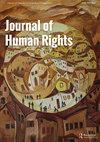International socialization, international politics, and the spread of state bureaucracies for women’s advancement
IF 1.6
2区 社会学
Q3 INTERNATIONAL RELATIONS
引用次数: 3
Abstract
Abstract Since 1975, almost every country in the world has formed a bureaucracy on gender equality. By 2018, more than 160 states had established offices for women’s advancement either at low (office within a ministry) or high (e.g., ministry) levels of government. Such institutional proliferation is puzzling because many of these offices are in states where women have low social, economic, and political status. Using cross-national data on developing states from 1971 to 2012, we examine major theoretical explanations of institutional diffusion and international incentives. Our results confirm existing research on socialization and norm diffusion. Our analysis demonstrates that international influences work in conjunction with domestic supportive structures to provide the most powerful explanation of when developing states adopt women’s bureaucracies for the advancement of women. Our findings have important implications for understanding international pressures and the role of donor intent in the process of global advancement of women’s rights.国际社会化、国际政治和国家官僚机构为提高妇女地位而进行的扩张
自1975年以来,世界上几乎每个国家都形成了性别平等的官僚机构。截至2018年,160多个州在政府的低级别(部委内的办公室)或高级别(例如部委)设立了促进妇女发展的办公室。这种机构的激增令人费解,因为许多这样的办事处位于妇女社会、经济和政治地位较低的州。本文利用1971 - 2012年发展中国家的跨国数据,考察了制度扩散和国际激励的主要理论解释。我们的研究结果证实了社会化和规范扩散的现有研究。我们的分析表明,国际影响与国内支持结构相结合,为发展中国家何时采用妇女官僚机构来提高妇女地位提供了最有力的解释。我们的研究结果对理解国际压力和捐助者意图在全球妇女权利进步过程中的作用具有重要意义。
本文章由计算机程序翻译,如有差异,请以英文原文为准。
求助全文
约1分钟内获得全文
求助全文

 求助内容:
求助内容: 应助结果提醒方式:
应助结果提醒方式:


